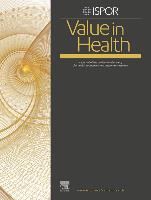Value in Health Themed Section Highlights Next-Generation Sequencing Technologies
 Lawrenceville, NJ, USA—May 26, 2020—Value in Health, the official journal of ISPOR—the professional society for health economics and outcomes research, announced today the publication of a series of articles focused on methods for moving from the evaluation of precision medicine into practice and policy. The series was published in the May 2020 issue of Value in Health.
Lawrenceville, NJ, USA—May 26, 2020—Value in Health, the official journal of ISPOR—the professional society for health economics and outcomes research, announced today the publication of a series of articles focused on methods for moving from the evaluation of precision medicine into practice and policy. The series was published in the May 2020 issue of Value in Health.
“Precision medicine is an emerging approach for disease treatment and prevention that takes into account individual variability in genes, environment, and lifestyle,” said Guest Editor Kathryn A. Phillips, PhD, Center for Translational and Policy Research on Personalized Medicine, University of California at San Francisco, San Francisco, CA, USA. “This approach allows clinicians and researchers to predict more accurately which treatments and prevention strategies for a particular disease will work in which groups of people.”
The themed section highlights next-generation sequencing technologies, which are the fastest-growing type of precision medicine technology. These technologies include panels that test multiple genes for a single indication, whole exome sequencing tests that evaluate the entire exome (coding regions of the genome), and whole genome sequencing tests that evaluate the entire genome.
In her introductory editorial, “Methods for Moving the Evaluation of Precision Medicine Into Practice and Policy,” Phillips provides historical perspective and introduces the other 5 articles in the series:
- “Being Precise About Precision Medicine: What Should Value Frameworks Incorporate to Address Precision Medicine? A Report of the Personalized Precision Medicine Special Interest Group,” by Eric Faulkner,Anke-Peggy Holtorf, Surrey Walton, Christine Y. Liu, Hwee Lin, Eman Bilta,j Diana Brixner, Charles Barr, Jennifer Oberg, Gurmit Shandhu, Uwe Siebert, Susan R. Snyder, Simran Tiwana, John Watkins, Maarten J. IJzerman, and Katherine Payne
- “Use of Real-World Evidence in US Payer Coverage Decision-Making for Next-Generation Sequencing–Based Tests: Challenges, Opportunities, and Potential Solutions,” by Patricia A. Deverka, Michael P. Douglas, and Kathryn A. Phillips, PhD
- “Insights From a Temporal Assessment of Increases in US Private Payer Coverage of Tumor Sequencing From 2015 to 2019,” by Julia R. Trosman, Michael P. Douglas, Su-Ying Liang, Christine B. Weldon, Allison W. Kurian, Robin K. Kelley, and Kathryn A. Phillips
- “Quantifying Downstream Healthcare Utilization in Studies of Genomic Testing,” by Zoë P. Mackay, Dmitry Dukhovny, Kathryn A. Phillips, Alan H. Beggs, Robert C. Green, Richard B. Parad, and Kurt D. Christensen
- “Addressing Challenges of Economic Evaluation in Precision Medicine Using Dynamic Simulation Modeling,” by Deborah A. Marshall, Luiza R. Grazziotin, Dean A. Regier, Sarah Wordsworth, James Buchanan, Kathryn A. Phillips, and Maarten Ijzerman
“Much progress has been made in developing and applying methods to evaluate precision medicine,” said Phillips. “Nevertheless, new tests such as minimally invasive liquid biopsies and emerging approaches such as artificial intelligence and machine learning platforms will continue to require the development and adaptation of methods used to assess the value of precision medicine. The collective efforts of a society like ISPOR can bring together the wide range of disciplines and stakeholders that will be needed to continue to evolve the methods and approaches used to assess precision medicine.”
###
ABOUT ISPOR
ISPOR, the professional society for health economics and outcomes research (HEOR), is an international, multistakeholder, nonprofit dedicated to advancing HEOR excellence to improve decision making for health globally. The Society is the leading source for scientific conferences, peer-reviewed and MEDLINE®-indexed publications, good practices guidance, education, collaboration, and tools/resources in the field.
Website | LinkedIn | Twitter (@ispororg) | YouTube | Facebook | Instagram
ABOUT VALUE IN HEALTH
Value in Health (ISSN 1098-3015) is an international, indexed journal that publishes original research and health policy articles that advance the field of health economics and outcomes research to help healthcare leaders make evidence-based decisions. The journal’s 2018 impact factor score is 5.037. Value in Health is ranked 5th of 98 journals in healthcare sciences and services, 4th of 81 journals in health policy and services, and 11th of 363 journals in economics. Value in Health is a monthly publication that circulates to more than 10,000 readers around the world.
Website | Twitter (@isporjournals)